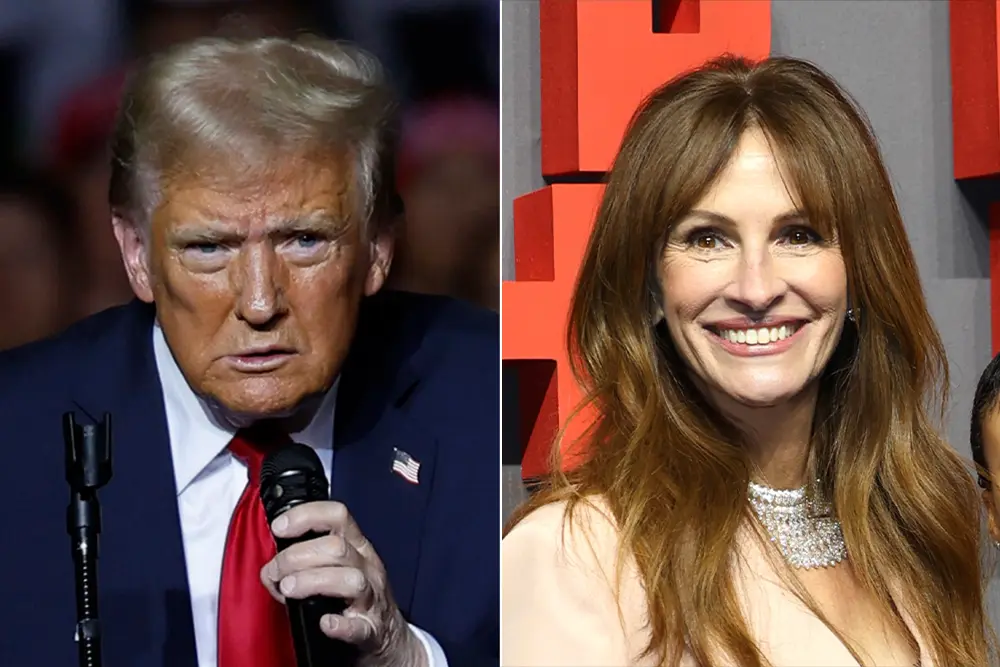Trump takes a swipe at Julia Roberts over campaign ad narration
The backdrop of a political critique
Donald Trump recently ignited a controversy with his sharp criticism of actress Julia Roberts for her involvement in narrating a political campaign advertisement supporting Kamala Harris and Tim Walz. The ad encourages women to exercise their voting rights independently, a message that Trump found distasteful. His remarks were made during a call-in segment on “Fox & Friends.”
Roberts takes the spotlight in the campaign ad
The campaign ad, produced by the progressive evangelical group Vote Common Good, features Roberts’ narration as it showcases a woman casting her vote for Kamala Harris, despite her husband’s apparent support for Trump. Roberts’ voice guides viewers through a poignant scenario where the woman’s secret vote underscores the sanctity of the voting booth.
“In the one place in America where women still have a right to choose, you can vote any way you want and no one will ever know,” Roberts says in the ad, reflecting on the ongoing struggle for reproductive rights.
This ad’s narrative aims to resonate with women who may feel pressured by external influences, emphasizing their autonomous power in the voting process.
Trump’s outspoken disapproval
Trump did not hold back his disappointment with Roberts. During his exchange on “Fox & Friends,” he expressed his belief that Roberts would regret her participation in such a campaign.
“I’m so disappointed at Julia Roberts. She’s going to look back on that and she’s going to cringe. ‘Did I really say that?’” Trump remarked.
He went further to question the integrity of relationships implied within the ad, suggesting it portrayed an unrealistic and “ridiculous” scenario.
“Can you imagine a wife not telling a husband who she’s voting for? Did you ever hear anything like that? Even if you had a horrible — if you had a bad relationship, you’re going to tell your husband. It’s a ridiculous thing. So stupid.”
The ad’s powerful narrative
In the ad, a woman is seen leaving the voting booth after casting her vote for Harris. Her husband inquires if she made the right choice, to which she confidently replies, “Sure did, honey,” before exchanging knowing glances with a female friend. This silent exchange signifies their unspoken solidarity and secretive support for Harris.
Roberts’ concluding lines reinforce the privacy and freedom of the voting experience.
“Remember, what happens in the booth, stays in the booth.”
Broader implications and reactions
This confrontation between Trump and Roberts highlights the broader cultural and political battle over women’s autonomy and the privacy of the voting process. It also casts a light on the evolving role of celebrity activism in the political sphere.
Expertise in political ad narratives
The political ad’s effectiveness hinges on its emotional appeal and the credibility of its narrator. Julia Roberts, known for her commanding screen presence and empathetic voice, adds significant weight to the message. Her involvement underscores a strategic choice to connect with women voters on a personal level, leveraging her public persona to emphasize the gravity of voting rights.
Authoritative perspectives on the controversy
Critics argue that Trump’s harsh words could alienate moderate female voters who value their voting privacy. By attacking a well-liked figure such as Roberts, Trump risks alienating not just the Hollywood elite, but also influential segments of the electorate.
Industry trends suggest a growing influence of celebrities in political campaigns, a trend that continues to shape the dynamics of voter engagement. As more campaigns harness the power of celebrity endorsements, the lines between entertainment and politics increasingly blur, creating complex dialogues on authenticity and influence.
Trustworthy analysis
The facts presented highlight a verifiable campaign initiative and the corresponding political backlash. It’s evident that the voters’ booth remains a sacred space for personal choice, a sentiment strongly reinforced through both the ad’s narrative and Roberts’ involvement.
A snapshot of celebrity influence in politics
Ultimately, this episode serves as a microcosm of the contentious and often personal nature of modern political discourse. Julia Roberts’ participation in the campaign ad is a testament to the powerful role celebrities can play in shaping political narratives, while Trump’s reaction underscores the polarizing effect of such endorsements in the current political climate.
For those interested in more details about political campaign ads and their impact, follow our updates and share your thoughts on social media.

 Italian
Italian







